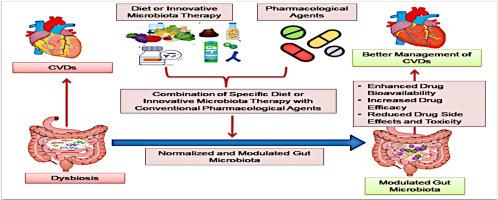Insights into the role of gut microbiota modulation in the management of various cardiovascular diseases: A new approach for improving the efficacy of current cardiovascular medications
IF 4.7
3区 医学
Q1 PHARMACOLOGY & PHARMACY
引用次数: 0
Abstract
Gut microbiome is an emerging contributor to various cardiovascular diseases (CVDs) where gut dysbiosis increases the risk of development and progression of atherosclerosis, coronary artery diseases, hypertension, and heart failure. Microbiota can also affect the metabolism of medications including cardiovascular drugs, resulting in alteration of their pharmacokinetics and pharmacodynamics or producing metabolites which can interfere with response of these drugs. Importantly, CVDs require prolonged pharmacological interventions with medications which may have impacts on the diversity and composition of gut microbiota. Gut microbiota modulation using diets, prebiotics, probiotics, fecal microbiota transplantation, antibiotics, and microbial trimethylamine-lyase inhibitors, has also shown benefits in the management of CVDs where gut microbiota and their metabolites have recently been studied as potential targets for the management of these diseases. Specifically, using innovative microbiota therapies in combination with traditional pharmacological agents have been evaluated for additional benefits in various CVDs. However, assessing the interactions among host factors, gut microbiome, and drug response will be essential for the development of new therapeutic targets for cardiovascular disorders, ultimately hoping better prognosis and patient's quality of life for those affected with CVDs.

肠道菌群调节在各种心血管疾病管理中的作用:提高当前心血管药物疗效的新方法
肠道微生物群是各种心血管疾病(cvd)的新兴贡献者,其中肠道生态失调增加了动脉粥样硬化,冠状动脉疾病,高血压和心力衰竭的发生和进展的风险。微生物群还可以影响药物的代谢,包括心血管药物,导致其药代动力学和药效学的改变或产生代谢物,从而干扰这些药物的反应。重要的是,心血管疾病需要长期的药物干预,这可能会影响肠道微生物群的多样性和组成。使用饮食、益生元、益生菌、粪便微生物群移植、抗生素和微生物三甲胺裂解酶抑制剂调节肠道微生物群也显示出对心血管疾病管理的益处,其中肠道微生物群及其代谢物最近被研究为管理这些疾病的潜在靶点。具体地说,使用创新的微生物群疗法与传统药理学药物相结合,已经评估了各种心血管疾病的额外益处。然而,评估宿主因素、肠道微生物组和药物反应之间的相互作用对于开发心血管疾病的新治疗靶点至关重要,最终希望心血管疾病患者有更好的预后和患者的生活质量。
本文章由计算机程序翻译,如有差异,请以英文原文为准。
求助全文
约1分钟内获得全文
求助全文
来源期刊
CiteScore
9.00
自引率
0.00%
发文量
572
审稿时长
34 days
期刊介绍:
The European Journal of Pharmacology publishes research papers covering all aspects of experimental pharmacology with focus on the mechanism of action of structurally identified compounds affecting biological systems.
The scope includes:
Behavioural pharmacology
Neuropharmacology and analgesia
Cardiovascular pharmacology
Pulmonary, gastrointestinal and urogenital pharmacology
Endocrine pharmacology
Immunopharmacology and inflammation
Molecular and cellular pharmacology
Regenerative pharmacology
Biologicals and biotherapeutics
Translational pharmacology
Nutriceutical pharmacology.

 求助内容:
求助内容: 应助结果提醒方式:
应助结果提醒方式:


